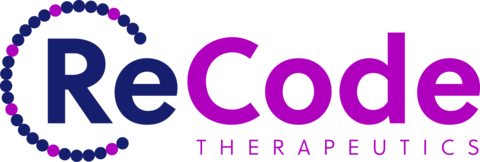ReCode Therapeutics Receives U.S. FDA Orphan Drug Designation for RCT1100 for the Treatment of Primary Ciliary Dyskinesia
ReCode Therapeutics Receives U.S. FDA Orphan Drug Designation for RCT1100 for the Treatment of Primary Ciliary Dyskinesia
MENLO PARK, Calif.--(BUSINESS WIRE)--ReCode Therapeutics, a clinical-stage genetic medicines company using tissue-specific delivery to power the next wave of mRNA and gene correction therapeutics, today announced that the U.S. Food and Drug Administration (FDA) has granted Orphan Drug Designation for RCT1100 for the treatment of primary ciliary dyskinesia (PCD). RCT1100 is a novel investigational therapy being developed to treat PCD caused by pathogenic mutations in the DNAI1 gene.
PCD is a rare and progressive genetic disease characterized by the dysfunction of cilia, which are microscopic hairlike structures that line the respiratory tract. Defective ciliary function results in the inability to clear mucus from the airways. As a result, bacteria and viruses become trapped in the airways, leading to chronic infections and compromised respiratory function, with a small percentage of patients requiring a lung transplant. Mutations in the DNAI1 gene account for approximately seven percent of PCD cases.
“PCD is a rare genetic lung disorder that currently has no FDA-approved treatments; therefore, receiving this designation is an important recognition for the PCD patient community," said Shehnaaz Suliman, M.D., MBA, M.Phil., chief executive officer of ReCode Therapeutics. "We are actively enrolling PCD patients in our single-dose study across the U.S. and UK and look forward to sharing an update when enrollment is completed.”
ReCode’s proprietary Selective Organ Targeting (SORT) lipid nanoparticle (LNP) delivery platform was used to develop RCT1100, an inhaled mRNA therapy designed to deliver DNAI1 mRNA to target airway cells. The DNAI1 mRNA is translated into the DNAI1 protein inside cells, which is intended to establish proper ciliary function by addressing the underlying cause of the disease. In preclinical studies, the company’s DNAI1 mRNA led to efficient production of the DNAI protein and rescue of ciliary function in relevant models of PCD.
ReCode is currently enrolling patients in Part B of a Phase 1, open-label study designed to assess the safety and tolerability of a single ascending dose of inhaled RCT1100 administered with a nebulizer in patients with PCD caused by pathogenic mutations in the DNAI1 gene. For more information, please visit clinicaltrials.gov.
About Primary Ciliary Dyskinesia
Primary ciliary dyskinesia (PCD) is a rare genetic disease characterized by deficient mucociliary clearance (MCC), chronic respiratory tract infections, bronchiectasis, and declining respiratory function. Mutations in more than 50 genes result in dysfunctional cilia and loss of MCC. PCD is a progressive disorder, meaning it will get worse over time, for which no cure or disease-modifying treatments currently exist. PCD is estimated to affect at least 1 in 7,500 people across diverse ethnicities, with approximately 45,000 patients in the U.S. Due to the lack of widespread screening, approximately 80% of people with PCD are thought to be undiagnosed.
ReCode has launched ThinkPCD.com, a program that provides genetic testing to PCD patients who qualify at no cost. Patients can enroll directly or through a healthcare professional who can go to the website to determine if their patients are eligible for genetic testing through the program.
About ReCode Therapeutics
ReCode Therapeutics is a clinical-stage genetic medicines company using precision delivery to power the next wave of mRNA and gene correction therapeutics. ReCode’s proprietary Selective Organ Targeting (SORT) lipid nanoparticle (LNP) platform enables highly precise and targeted delivery of genetic medicines directly to the organs, tissues, and cells implicated in disease, enabling improved efficacy and potency. ReCode’s lead programs include RCT1100 for the treatment of primary ciliary dyskinesia caused by pathogenic mutations in the DNAI1 gene, and RCT2100 for the treatment of the 10-13% of cystic fibrosis patients who have Class I or other mutations in the CFTR gene that do not respond to currently approved CFTR modulators. RCT1100 and RCT2100 are inhaled disease-modifying mRNA-based therapies formulated using the SORT LNP delivery platform. ReCode is expanding its pipeline to develop potential therapies for other rare and common genetic diseases, including musculoskeletal, central nervous system, liver, and infectious disease indications.
ReCode has been recognized by the San Francisco Business Times and Silicon Valley Business Journal as a Best Place to Work. For more information, visit www.recodetx.com and follow us on LinkedIn and Instagram.
Contacts
Investors:
Anne Marie Fields
Stern IR
annemarie.fields@sternir.com
IR@recodetx.com
Media:
Erica Jefferson
SVP, Corporate Affairs
ReCode Therapeutics
ejefferson@recodetx.com
650-629-7965
Tara Cooper
The Grace Group
tara@gracegroup.us
650-303-7306
